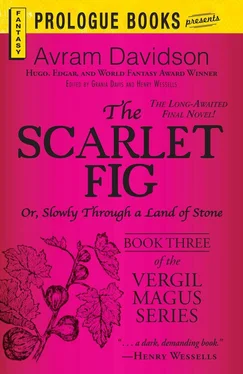The Lotophagi received the sweet wine with soft soft sounds of pleasure. They would not plant the vines nor trench them nor wed them to the poplar and the elm to hold up the grape-heavy branches; and certainly neither would they make them presses nor tred the wine-fruit out with their feet … though possibly if this had been made into a game for them, with music and with song, they might have done so. Briefly. Certainly they had no sophisticated tastes; they did not require hippocras, that vile mixture of very bad wines, itself sophisticate with many bad spices; neither had they developed the corrupt palate which fancies the taste of pitch in wine, and which actually prefers the wine of that sort of grape which was said to have naturally the taste of pine-sap. Wine, sweet wine, did not have to be very, very sweet for them to like it. With soft sounds of pleasure they received and drank of it.
But by and by they did not trouble themselves to go in search of any more moonstone or tourmaline. There was no ivy mingled with the cheap, douce wine. It did not make the Lotophagi run mad, let alone turn anthropophagi like followers of certain drunken cults. Merely they layed them down to sleep.
Of course to the inhabitants they were, for the moments that the novelty lasted, not rubbish at all. And if the hotchpotch and galimaufry was of no actual benefit to them … why, neither were the moonstones or the tourmalines for which they sold them. (Not that it was likely that they considered the matter in any other light than an exchange of presents: baubles for baubles, play-pretties for others of the same.) For that much, of what actual, intrinsic use were the tourmalines, the moonstones, or any other gems or jewels? none whatsoever: they could not be eaten, drunk, nor used as tools. Well … diamonds were sometimes so worked as to be able to cut glass … and an old word which Vergil seldom forgot was that in verbis et herbis et lapides — but here he suddenly dropped all thought of science or art or philosophy; one of the island folk taking notice of his presence with a slight word and slight gesture, see every man jack of the Sard shipmen turn as one. And of that sudden second, freeze.
After a very long moment, one of them (later he learned it was Polycarpu the captain of the craft — it was a small-enough craft, too —) spoke, not without a moving up and down of the apple in his thick neck. His words were in a tone clearly meant to be conciliatory, but Vergil noted well how the seamen, the shipmen, slowly gan to fan out as though to encircle him. “As you may see, me Lord Ser, we are only small folk,” he said … in Punic! surely no folk he had ever encountered, the same being of the “old sea,” the Mediterranean, ever looked less like Punes! … “— small folk, a-trying to do a small deal in what’s they called, ‘semi-precious stones,’ such a trade, we believes, being entirely licit undern the rules of Great Cartage,” and the light burst upon Vergil: it was not that they were Pune, it was that they thought that he was! And, despite his own better nature, he reckoned to have a little sport with them.
“Such being the case,” he endeavored to make his own Sidonian sound as much like Carthagan as he might: no great hard thing, for constant commerce between the old Phoenician cities and the new had kept them from shifting and changing much; “… being the case, how is’t that you have endeavored also to deal in … purple … ?”
In a moment he regretted having tried the jape, for the man turned absolutely yellow; had he been of ruddy color, he would have turned white. At once Vergil swift began in Latin, “Nay, but take no notice of my very bad manners, I am a Latin man, the same as you, a citizen of Rome,” briefly he thought of groping in his budget for the old badge of bull’s hide, SQPR, Senatusque Populusque Romanum estamped upon it; but forbore. “— and no Pune at all,” see the natural tan of sea and sun return to the shipman’s face; “and as for whatsoever kind of trade is yours, I care not, for —”
“But you be a mage! else how could you know —?”
Vergil gestured. “I see that some leaves of orchil-flowers have been near enough t’ your wristband to have been crushed upon it … added but a few drops of water, likely when you took a drink, added but a bit of lime, perhaps from a cargo of it: and the result? a smear or smudge of violet color … well … violet color once . And if indeed you propose to make navigations in waters where Carthage, old or new …” He did not finish the sentence. “Violet is not indeed true purple, but … another shirt is what I should suggest.”
The man stretched his arm to see the stain plain, swore, made as if to remove it on the spot, somewhat relaxed.
“ ‘Not indeed true purple,’ no, but near enough to run this sark red, be any Carthagan ships about. Lord Ser, me thanks for a-pointing of it out, I never gave thought … Well, I shall cut and burn this damned wristband in another minute. I say, nay: but only a mage could have discerned of it, and coupled twain and twain thegether.”
His men whispered, muttered, growled. But there were no more movements hinting at encirclement. Said one, in a speaking-tone at last, “If that be clare from just a spackle on a wristband, best we’d best wash and scrape the deck, and check they tayckle for some other tell-tale taint.”
And another urged, “And afore doing of that, be better best to hug up all the orchil and give it to offering for nap tewm —”
“Nap tewm?” asked Vergil.
“Th’owd king. Owd King Naptewm, a whose beard is green, they’m say, and smell’s o’ fish. E nows the dipth of every sea. Better ‘e gets all o’ it than the Cartage men take owt o’ it, and ang us on a tree, such is they manner and wont —”
And yet another shipman uttered his own caution. “After cutting of our hentrials out and grilling same as a relish for they savage dogs.”
But the thick-necked man, and it seemed his neck grew thicker, all but roared his scorn. “You knew what barber we might be trimmed by when you came aboard this adventured navigation! Stay here, then, if you like, and give surrender to your lay of the cargo as lies hid beneath the jars of limekilned and burnded oyster-shells! Stay here, and drink yourselves sotty until you’ve forgotten use of tongue and tool and wander naked as any —”
Very suddenly he stopped and turned a deeper shade and attempted to pretend that, suddenly, no one was aware that Vergil was naked as any islander: that is, as the days they all were born — save only that no natal-cord dangled a-peep from out a belly-band. And, for that matter, neither did they (or he) have even upon them so much as else a belly-band.
Quietly he said, “You will do as you will do. Only but I caution you to taste no drop of this sweet ruddy nectar of the lotus, for I drank of it, I was marooned because of it, and I am naked, now, because of it. I dwell at Naples; is it possible that you can give me a passage in that way?”
One by one they all nodded. Some nodded more soonly, some more slowly, some more deeply.
But they all nodded.
Yes.

The secret of the Castor and Pollux … (“A small ship for so long a name?” “Them be’s the famous Gemini Twins, My Sir. As we only calls they Castor and Pollux for short. Beseeing as how they’d shared the one hegg shell for their gemination, and which it had hample room for they both, we think they’ll take it as a hint so we’ll hall have a suffice of room in this small craft, no much larger has a small hegg shell, ye might say” “I quite see.” “We thought, too, we’d gain a double blessing by such a nime. Has they not seldom is beseen a riding of the wives in tide of storm.” “I quite see.” And Polycarpu, much gratified by his passenger’s grasp of mythology and method, smiled a wide and pleasant smile.)
Читать дальше












